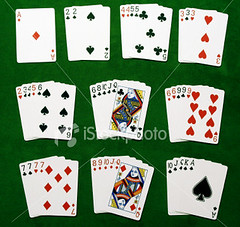
Omaha and holdem poker rules comparison. The 1st Part
1) Hand ranks in Omaha holdem poker rules is as follows.
The hands which are feeding you in Texas holdem are quite weak in Omaha poker. We’re talking about the things like “top pair” or “overpair”. You should be very lucky to win in Omaha with a simple pair. We will add that two pairs with bottom cards or with the top and the bottom card are not very good combinations in Omaha too. So what hands are going to try and make? We’d like to get two top pairs, middle three-of-a-kind or drawn nuts. The best hand in Omaha is so-called many-sided hand, i.e. a hand combining a ready combination and a drawn one.
When playing Omaha holdem poker, pay attention that:
It is possible to make a mistake thinking that in four-card game the number of combinations is doubled, it should be kept in mind that in addition to A-B, C-D combinations there are A-C, A-D, B-C and B-D combinations. Thus in Omaha the number of combinations is six times as big. Example: there is a pair on the board; the possibility of someone’s having a set in four-card game doubles. However, considering the probability of a straight, the possibility of having the right pair is sixfold. Straits appear in Omaha very often.
2) More players stay in Omaha to see the flop.
A good starting hand in holdem, like a high pair, is often quite strong to street during the deal without getting help of the board. In Omaha overpair is rarely a playable combination after the flop. Any starting hand even if it has two aces needs the board help to continue the fight over the pot. Thereby the priority of a good starting hand over a moderate one is not so strong in Omaha holdem poker rules. It results in the fact that more players stay in the game to see the flop. Naturally the more money there is in the pot before the flop, the more players have reasons to fight after the flop and during the whole dealing. That is why Omaha pot usually holds more money in it than holdem.
3) Checking a good hand in Omaha holdem poker rules is more dangerous.
 There are two reasons for this. The first reason: there is a general principle in poker that the more money there is in the pot the less attention is paid to cheating. Under the circumstances that before the flop there is considerable sum of money in the pot; it is wise to make bets defending your hand in your turn. We’ve seen players who tried to check-raise during the flop trying to win two or four additional points of bets when there had already been 50 or 60 points in it. It is obviously a low-standard strategy. Secondly, it is probable enough that somebody will manage to improve his hand (better than yours) by the help of a free cardб when you have in the pot more opponents than in holdem and each and every of them also has twice as many cards. Bear in mind that checking of the flop is bad not only when the free card really “beats” you. It is also bad when the opponent, which showed little interest during the flop gets enough support after the fourth street (card) to stay in the pot and beats you on the fifth street. It is even worse when an unexpected card appears on the board “killing” the value of your hand and letting your opponent (which you can beat) to win by bluffing. Such troubles (avoidable) usually hit your pocket and your mood pretty well. Even your attempts of bluffing move the pot away from you, and it can cost you a bet anyway.
There are two reasons for this. The first reason: there is a general principle in poker that the more money there is in the pot the less attention is paid to cheating. Under the circumstances that before the flop there is considerable sum of money in the pot; it is wise to make bets defending your hand in your turn. We’ve seen players who tried to check-raise during the flop trying to win two or four additional points of bets when there had already been 50 or 60 points in it. It is obviously a low-standard strategy. Secondly, it is probable enough that somebody will manage to improve his hand (better than yours) by the help of a free cardб when you have in the pot more opponents than in holdem and each and every of them also has twice as many cards. Bear in mind that checking of the flop is bad not only when the free card really “beats” you. It is also bad when the opponent, which showed little interest during the flop gets enough support after the fourth street (card) to stay in the pot and beats you on the fifth street. It is even worse when an unexpected card appears on the board “killing” the value of your hand and letting your opponent (which you can beat) to win by bluffing. Such troubles (avoidable) usually hit your pocket and your mood pretty well. Even your attempts of bluffing move the pot away from you, and it can cost you a bet anyway.
For continuation see Part 2.